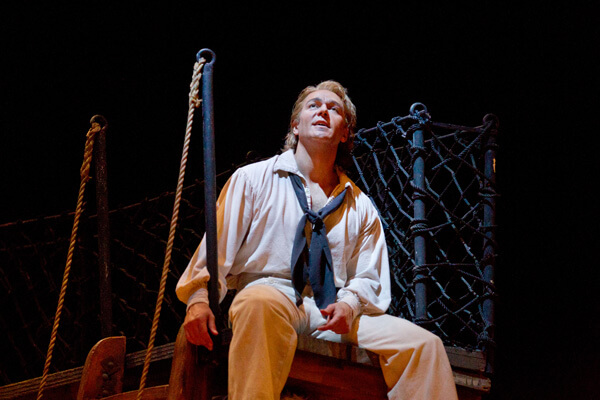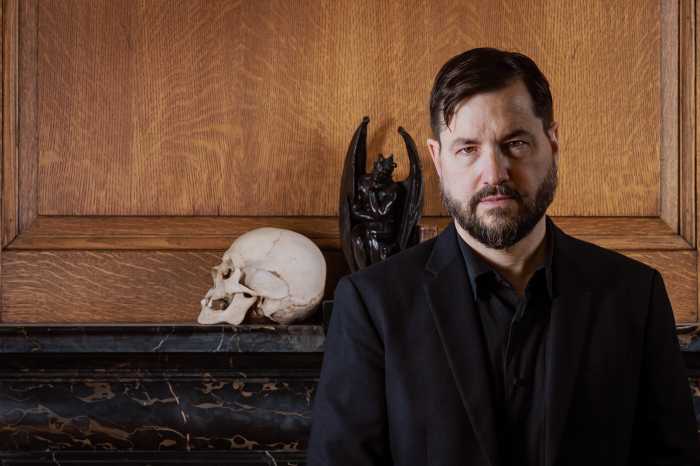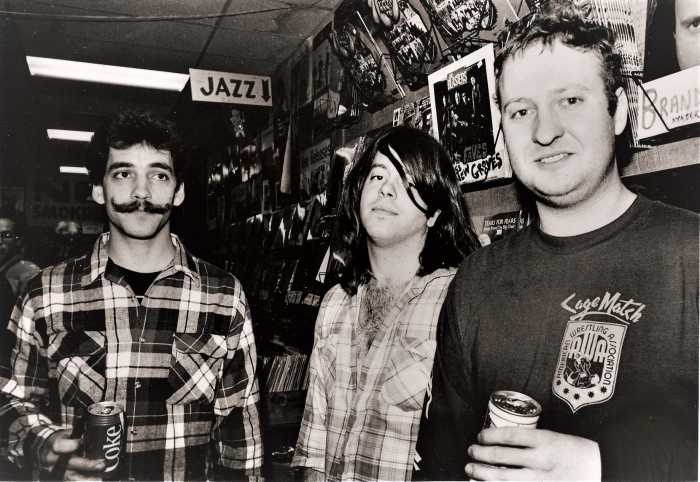David Daniels gave an intriguing recital May 3 in Princeton University’s Richardson Auditorium — a handsome space with a renovated concert series worth checking out. Part of the recital, with veteran pianist Martin Katz, drew from the countertenor’s accustomed fare — 19th century adaptations of Early Italian songs like Caccini’s “Amarilli” (a particular highlight here), some elegant, archaizing Reynaldo Hahn salon numbers, and some American folk songs. This last set, in adaptations by Steven Mark Kohn, were very entertaining — and, in Daniels’ rendition of “On the Other Shore,” moving. Still, despite the pointed quality of his diction, it would have been nice to have the words to glance at in the program.
The rest of the recital featured a collaboration with six gifted young dancers from the Mark Morris Dance Group. Simply clad, they did interpretive movement around Katz and Daniels. Morris’ choreography always derives from musical phrasing, and the visual pairings-off made sense. The results proved best in the folkish Brahms folk songs. The three songs from Berlioz’s “Nuits d’Ete” — the up-tempo frame songs around the wrenching “Spectre de la rose” — mean so much and were compellingly sung with fine legato by Daniels, so that the dancers seemed merely distracting. I closed my eyes and listened.
The dancers returned, with more welcome effect, for the encore — Gluck’s “Che faro” from the Daniels/ Morris collaborative “Orfeo” at the Met. Daniels remains one of his generation’s defining classical singers, worth traveling to hear. Fortunately, next season in New York, he’ll be prominent locally as Handel’s Radamisto (Carnegie) and Cesare (Met), both led by Harry Bicket.
John Dexter’s 1978 staging of Britten’s Melville-based masterwork “Billy Budd” remains powerful and eye-catching, if occasionally overindulgent in its symbolism. Surely it’s a mistake to have the titular Handsome Sailor and his repressed, lust-twisted accuser, Claggart, walk side by side down to the tribunal called by Captain Vere. But the piece held the rapt attention of a near-capacity Met audience May 4.
Nathan Gunn has offered excellent Billy Budds to San Francisco and Chicago; sadly, the Met came late to this. Gunn’s voice is no longer fresh enough, especially on top, to make one not notice the lack of volume for ensemble moments in this huge space. He gave a good impersonation — sincere, well-phrased — faring best in lightly scored legato sections.
British tenor John Daszak, debuting as Captain Vere, offered clarity of words but not much depth of feeling in uttering them. Attractive at low dynamics, his voice turned strident and flat at full volume. After William Burden’s masterful 2008 Santa Fe Vere, he would seem the natural candidate for the Met — if one didn’t know the anglophilic bent of the Met’s casting directors.
James Morris’ much-acclaimed Claggart has always struck me as just unmodulated growling and posturing. Except for weak lows, however, he was in good form. Any artist who can maintain a high vocal standard in a leading role for 34 years deserves some credit.
The most vocal pleasure came from the three secondary, low-voiced officers — Kyle Ketelsen, in terrific, juicy voice as Flint, welcome debutant Ryan McKinny as Ratcliffe, and the Redburn of Dwayne Croft, who in 1997 sang Billy. Other strong, telling work came from Keith Jameson (Novice), Allan Glassman (Red Whiskers), and John Moore (Donald) — all of whom relished and projected the text in good sound. Eliott Madore (as the Novice’s Friend, Gunn’s 1997 Met assignment in this score) again puffed up his fine voice in the big auditorium; doubtless he’ll be doing Billy before long.
The orchestra under David Robertson — in theory, an excellent conductor for this idiom — proved notably under-rehearsed in Britten’s magnificent, demanding score. The brass section in particular made many awkward entrances, spoiling some delicate chords. The chorus sang well, but overall pit/ stage coordination was not yet ideal. Still, “Billy Budd” was a worthwhile experience. Let’s hope the Met revives this fine production and work soon.
“The Makropulos Case” (May 8 ) also represented a revival, but thanks to Janacek expert Jiri Belohlavek’s translucent, powerful conducting and Karita Mattila’s stunning embodiment of the central vampirish siren, it made a triumphant close to the Met season. Elijah Moshinsky’s production has some odd scenic elements — what is that Egyptian tomb doing in Emilia Marty’s dressing room? — but has held up quite well.
As the 337-year-old name-shifting diva, Mattila unleashed an arsenal of vampishness and wit, looking sensational in her costumes and inflecting the text with poignancy and insight. Her voice retains much allure, though the change in color at range extremes made one doubt the wisdom — even the possibility — of her undertaking Verdi’s Amelia next season. But her Marty was thrilling. Too bad no HD filming had been scheduled.
Richard Leech returned to the Met as Albert Gregor, the diva’s most besotted suitor (and also her remote descendent!). Leech displays almost none of his erstwhile beauty of tone, though with stylistic coaching, he could use his secure, loud sound in several other major Slavic tenor roles.
Two rather similar bass-baritones of different generations — Johan Reuter and Tom Fox — brought strong vocalism and the needed potent presence to Prus and Kolenaty. Alan Oke (Vitek), Bernard Fitch (Hauk) and — one of the few Met comprimarias who always sounds good — Edyta Kulczak (Chambermaid) offered outstanding cameo turns.
Christine Brewer’s May 13 Tully recital of American songs with Craig Rutenberg was lovely — honest phrasing, billowing dramatic soprano tone only slightly touched in its upper register by time’s advances, and real communicative skills. Barber, Ives, and Harold Arlen all got immaculate readings. Susan B. Anthony’s final monologue from the Virgil Thomson/ Gertrude Stein “The Mother of Us All” fit her to a T.
But where were all New York’s young singers — home watching Kelly Clarkson on Youtube? And, poignantly, why has New York heard this great American soprano in only two staged performances (of Strauss’s Ariadne at the Met in 2003)? If that’s to be rectified, serious planning better start very soon.
David Shengold (shengold@yahoo.com) writes about opera for many venues.



































